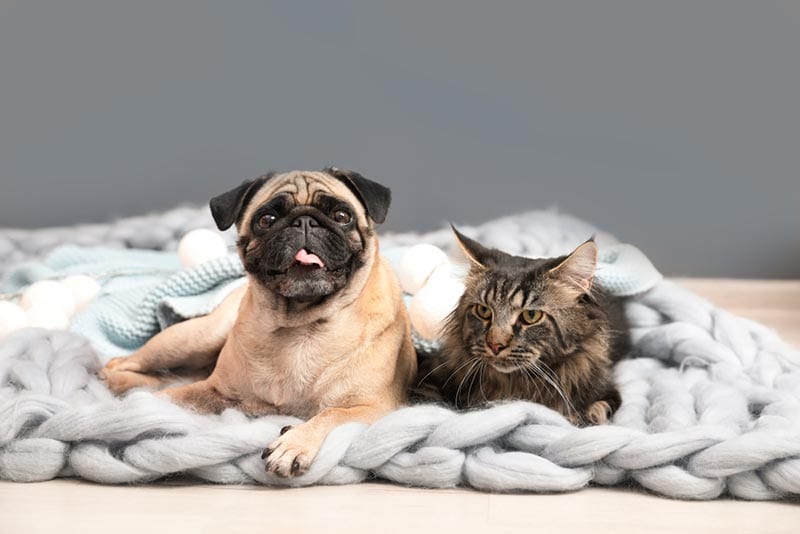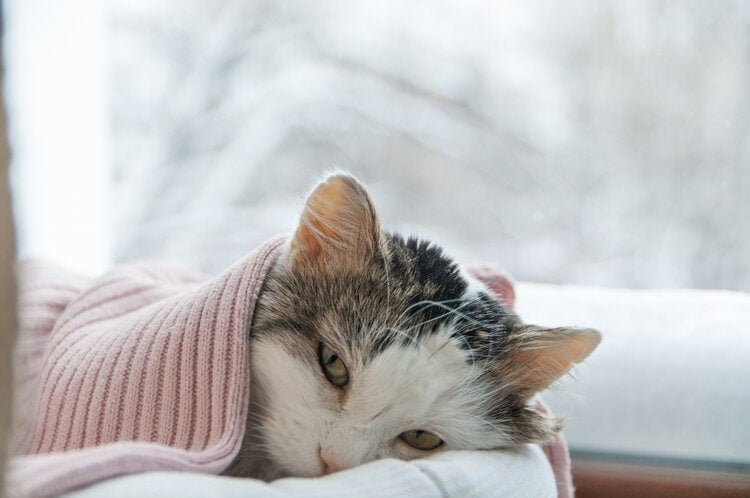What To Do If My Cat Has Blood in Its Stool? Vet-Approved Causes & Solutions

Updated on
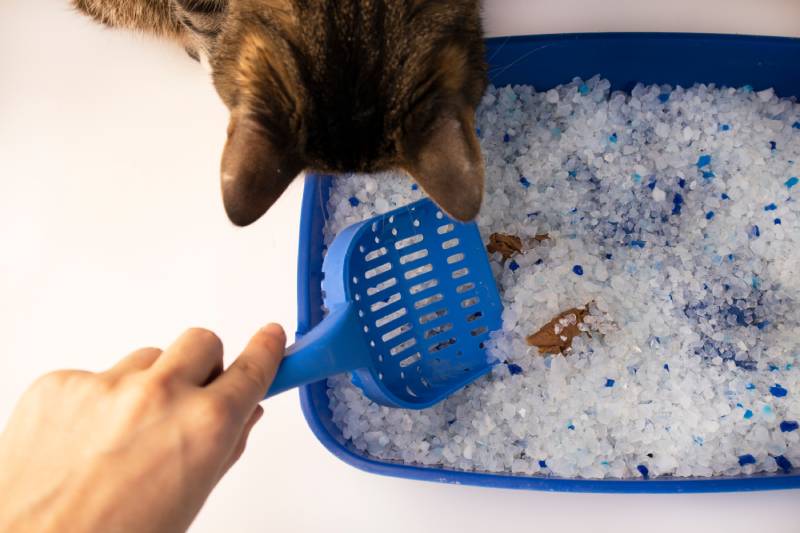
Click to Skip Ahead
Have you noticed blood in your cat’s stool? If so, it can be a sign of several very serious complications.
If your cat has had blood in her stool, the first plan of action is to call your vet. As soon as your cat receives a physical exam at the vet, the next step will be determining what is causing the condition. Your vet can determine the cause and will help you strategize a treatment plan depending on the type and severity of the condition.
If your cat is in no immediate danger and you are simply curious about learning about this on your own, this article details some of the complications that can cause bloody stools.
What To Do if There Is Blood in Your Cat’s Stool
You may be understandably alarmed if there is blood in your cat’s stool. Do your best to remain calm and follow these instructions.
1. First, Contact the Vet
As stated before, the priority is to ensure your cat is properly cared for by professionals. A veterinarian will be able to examine, diagnose, and suggest treatments for your cat. It is important that you reach out to the vet immediately since some conditions could be fatal if not promptly addressed.
2. Report Other Symptoms
Beyond the blood in the stool, has your cat been acting strangely recently? Have they seemed tired, irritable, or unwilling to eat?
Record any abnormal behaviors your cat may have displayed to help your vet make an accurate diagnosis.
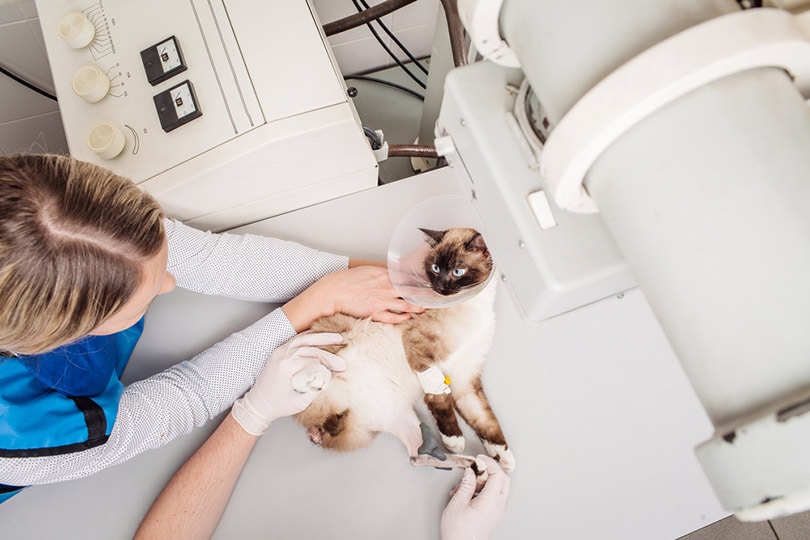
What Are Some Causes?
Several issues could cause your cat to have bloody stool. Though not every possibility is listed in this article and some are much more common than others, we aim to cover important differential diagnoses when it comes to bloody stool in cats.
1. Intestinal Parasites
The thought that parasites could be hurting your cat is frightening. One such parasite, coccidia, can make its home in the walls of the cat’s intestines, and be a cause of bloody stool and diarrhea. It is more common in kittens but can also affect adult cats. The parasite can spread from cat to cat through their feces—which could occur, for example, if two cats share a litter box. Coccidia and other intestinal parasites can be treated with the appropriate oral deworming medications.
2. Feline Distemper
Feline Distemper is a highly contagious virus spread through contact with saliva, blood, nasal discharge, urine, or feces from an infected cat. There is no cure, but treatment is possible, and vaccinations are available to prevent an infection in the first place.
Other signs of the virus include depression, lethargy, diarrhea, vomiting, and anorexia. Though treatment is possible, most cases of feline distemper are fatal. Your vet may recommend antibiotics, medication for diarrhea and vomiting, fluid therapy, and hospitalization.
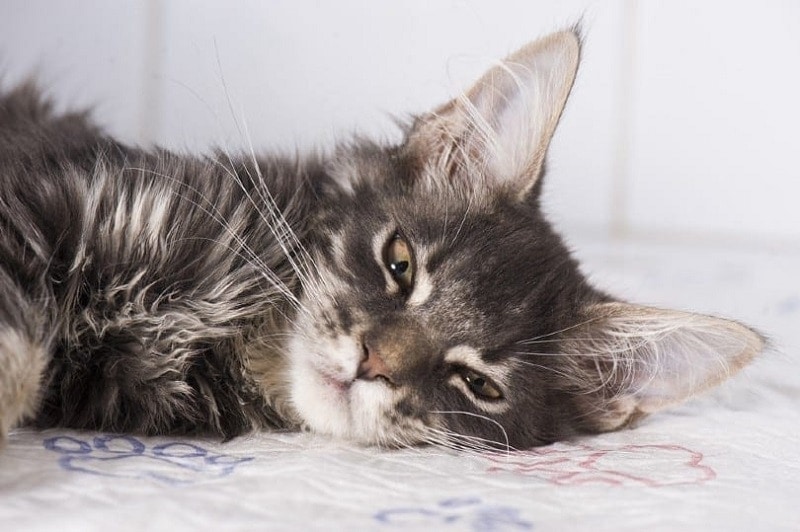
3. Lymphoma
Lymphoma is a cancer in which the body’s immune system is significantly compromised. Symptoms can include lumps in the body (particularly of lymph nodes that can be palpated in the neck, back of the knees, and shoulders), loss of appetite, weariness, and weight loss. Treatment for lymphoma is often chemotherapy, radiation, or sometimes a combination of the two.
4. Inflammatory Bowel Disease
Inflammatory bowel disease (or IBD) hinders nutrients in a cat’s food from being properly absorbed and prevents regular digestion. It is a diagnosis of exclusion when other common reasons for diarrhea and vomiting, such as pancreatitis, parasites, infection, liver disease, etc., have been ruled out.
Signs that your cat may have IBD include diarrhea, vomiting, gas, difficulty defecating, change in appetite, and weight loss. Medications will likely be prescribed to treat the symptoms of her condition, and a dietary change will probably be recommended. Antibiotics can be used to manage gut bacteria, and other medications may be administered to reduce inflammation.
Other Complications
Other than the conditions listed here, several other complications could cause your cat to have bloody stool. Some of these include the following:
- Food intolerance
- Infection
- Rectal polyps or tumors
- Trauma
- Anal gland abscess
- Constipation
Conclusion
Bloody stools can be a sign of a concerning complication. If you notice any blood in your kitty’s litter box, reach out to your vet right away. As serious as these conditions are, many are treatable as long as they are detected quickly. Always pay close attention to your cat and report unusual symptoms to your vet to ensure the well-being of your furry friend.
- Related Read: Cat Poop Chart: Vet-Approved Color & Consistency Guide
Featured Image Credit: RJ22, Shutterstock



